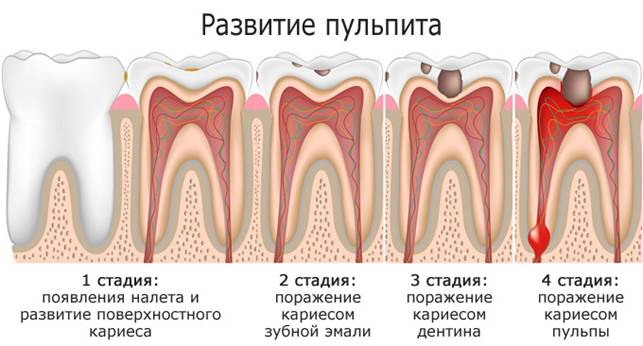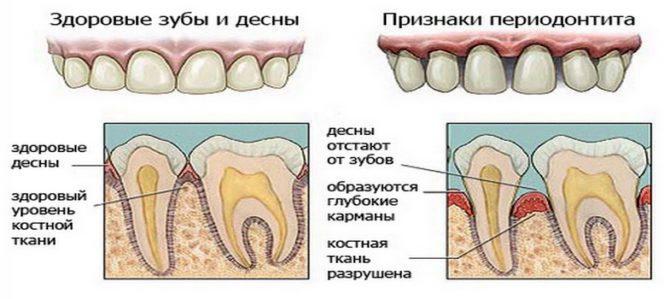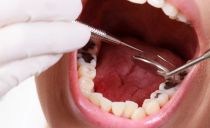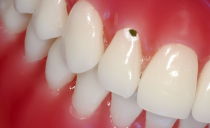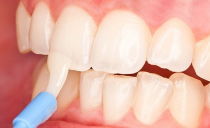How to anesthetize a toothache during pregnancy: permitted painkillers and folk remedies
Toothache during pregnancy is complicated by the fact that it is problematic to anesthetize teeth during this period: expectant mothers are forbidden to take most of the drugs because of their adverse effects on the baby’s body. But to endure pain is also impractical, since this is an additional stress for the woman's body. It is necessary to consult a doctor to recommend a safe pain medication and eliminate the cause of inflammation and pain.
Content
Causes of Toothache
All causes of pain can be divided into specific and non-specific. The former are typical only for pregnant women and are associated with changes in the female body during gestation. And the latter can occur in any person, so you can deal with them using standard methods.
Nonspecific
Among the main non-specific causes of toothache are:
- teething of the third molar;
- caries and pulpitis;
- periodontitis.
Teething wisdom
Teething wisdom can begin at any time. This process is always accompanied by pain, but does not always require medical intervention.
If a wisdom tooth erupting in a pregnant woman hurts badly, you can anesthetize it with all the permitted methods. But categorically it is impossible to remove, since there is a high probability of developing a serious inflammatory process, for the relief of which you will have to drink antibiotics.
Caries and pulpitis
Caries is one of the most common dental problems in which toothache occurs, most often acute and short-term. With the disease, the bone tissue is destroyed, carious cavities that expose the nerve are formed inside the diseased tooth. Only a doctor is able to save a person from caries, simple anesthetics do not destroy the cause of pain.
Pulpitis is an inflammation of the internal soft tissues of the tooth, which is characterized by the appearance of wave-like attacks of pain, and mainly at night. The pain is not acute, but aching.
Periodontitis
If you start pulpitis, it can develop into periodontitis - inflammation of the deep pericarp tissues. The patient will be disturbed not only by pain, but also by such symptoms:
- the appearance of an unpleasant putrefactive odor, which cannot be eliminated with the help of ordinary chewing gum;
- increased acute pain when biting;
- sensation that the tooth is extended from the jaw;
- temperature increase up to 40 ° C;
- body aches.
The presence of an inflammatory process in the oral cavity adversely affects the development of the fetus, so during pregnancy it is extremely important not only to reduce toothache, but to destroy the focus of infection.
Do not postpone a visit to the dentist, because delay can cause complications, which will result in surgery and anesthesia.But standard dental procedures, for example, the treatment of superficial caries or a tooth with a removed nerve, can be performed without anesthesia.
Specific
Sometimes severe toothache occurs precisely because of pregnancy: due to certain physiological changes in the body. This phenomenon can be observed even when all the teeth are cured.
Specific causes of tooth pain include:
- hormonal leap in early pregnancy;
- decreased immunity, since all the protective functions of the female body are aimed at protecting the fetus;
- exacerbation of chronic diseases of the oral cavity;
- avitaminosis;
- lack of calcium in the body;
- toxicosis, vomiting and more viscous saliva increase the acidity of the oral cavity, leading to thinning of enamel and a general deterioration of the condition of the teeth;
- increased tooth sensitivity, which is almost impossible to remove before the birth of a child.
The danger of pain relief during pregnancy
With the help of anesthetics, you can not get rid of the cause of inflammation. They simply block the formation of signal prostaglandins and their progression to the nerve endings: it is the sedimentation of these enzymes on the receptors that leads to pain. Analgesics allow you to temporarily stop the pain, but do not guarantee complete relief from unpleasant sensations.
The active substances of analgesic drugs in most cases have a small molecular weight. When ingested, they first penetrate the digestive tract, and then are absorbed into the blood. After this, the components of the analgesics break down into many small particles, otherwise they will not be able to effectively affect the nervous system.
Anesthetics easily penetrate the placental barrier, which can lead to irreversible consequences for the health of the child:
- chronic diseases of the gastrointestinal tract, for example, gastric ulcer;
- preeclampsia and water retention in the body;
- violation of the kidneys and liver, these organs simply can not cope with the withdrawal of matter from the body;
- cardiovascular diseases;
- teratogenic effect of drugs - improper intrauterine development.
What kind of painkillers can pregnant with toothache
When treating a tooth during pregnancy, it is necessary to comply with all the doctor’s prescriptions, especially those regarding dosage. In no case should you self-medicate. The sore spot should not be warmed or supercooling, as this can lead to complications.
First trimester medicines
In the first 12 weeks of pregnancy, the fetus is extremely vulnerable due to insufficient development of the placenta. During this period, you need to limit the intake of any medications, but only if there is no risk to the life of the future mother. If the tooth just aches, taking medications is optional.
In the second trimester, the child is under placental protection, therefore, during this period of pregnancy, you can take pills for toothache, but only with the permission of the attending physician.
The nuances of anesthesia in the third trimester
In the later stages of pregnancy, pain medication is allowed, but special care should be taken, since when the active components of the drugs penetrate the placenta, they do not fully form the children's organism to fight harmful substances. This can lead to serious complications.
Dosage forms used in dentistry
There are 4 forms of release of pain medication that can be used during pregnancy:
- tablets;
- candles;
- ointments and creams;
- solutions for injection.
Tablets
 The effectiveness of tablet preparations does not always meet the necessary requirements. When taken orally, the active substance is absorbed into the blood due to diffusion through the intestinal wall, then it spreads with blood flow to the tissues and cells of the body, and then is excreted by the liver and kidneys.
The effectiveness of tablet preparations does not always meet the necessary requirements. When taken orally, the active substance is absorbed into the blood due to diffusion through the intestinal wall, then it spreads with blood flow to the tissues and cells of the body, and then is excreted by the liver and kidneys.
But during pregnancy, the digestive tract organs work less efficiently, for example, the stomach and small intestine are emptied with a delay, and metabolic processes occur at a faster rate.
In a pregnant woman, the blood volume increases, so the concentration of the active substance from the taken medicine will be less than expected.
Candles
Candles last longer than tablets, but the effect of them comes later. Since the active substances enter the bloodstream through the rectal mucosa, they can be used only with mild seizures. Candles will not help soothe acute pain.
Injectable solutions
The use of solutions for injection is permissible only for severe pain, since in this case the active substance enters the bloodstream immediately, acts as quickly as possible and can cause significant harm to the baby. Injections are prescribed only during treatment in a hospital.
Ointments and creams
The active substances of ointments and creams also penetrate the placenta, although in small concentrations. Such drugs are indicated during pregnancy, if you need to remove a mild toothache. But ideally, it’s better to endure it than to take medicine.
With local use of drugs, side effects from them are less, therefore, the oral method of taking drugs is often replaced with this method of use. For example, you can crush a tablet in a mortar and put the powder on a painful area or moisten a cotton swab in a solution for injection and apply to an inflamed area. Most often, a solution of novocaine is used for these purposes, which quickly reduces pain.
What kind of analgesics are allowed during pregnancy
Not all pain medications can be taken with toothache during pregnancy, since the hormonal background of a woman during child bearing is extremely unstable, and almost all incoming substances penetrate the placenta to the fetus.
Prohibited painkillers
Pregnant women should not take medicines based on:
- aspirin, since it is able to provoke a miscarriage, causes bleeding and leads to malformations;
- ibufen because it can reduce the amount of amniotic fluid;
- Ketorolac, as this substance is toxic and negatively affects the fetus.
All medicines with adrenaline are forbidden, as well as medicines with a pronounced analgesic effect: Ketorol, Ketanov. They will help to cope with the pain, but they will cause irreparable damage to the baby’s health.
Analgin during pregnancy is strictly prohibited. It negatively affects not only the development of the fetus, but also the body of the expectant mother, especially the cardiovascular system. In European countries, the release of analgin has already been discontinued, but in the Russian Federation its production was not even able to be reduced due to the low cost of the drug.
Diclofenac and its analogue Voltaren are potent analgesics, therefore, their use during pregnancy is allowed only for vital indications. In the last trimester, these medications can cause weak labor and poor blood supply between the mother and the baby, so they should be removed from the medicine cabinet.
Allowed Analgesics
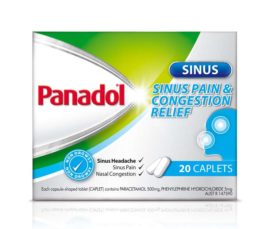 Pregnant women are often prescribed paracetamol (Panadol) to relieve toothache. The products of its metabolism, although toxic, are present in low concentration and are rapidly excreted from the body. Paracetamol is recognized as the safest analgesic, but in the third trimester it should be taken with caution.
Pregnant women are often prescribed paracetamol (Panadol) to relieve toothache. The products of its metabolism, although toxic, are present in low concentration and are rapidly excreted from the body. Paracetamol is recognized as the safest analgesic, but in the third trimester it should be taken with caution.
No-shpa (Drotaverinum) practically does not affect the fetus, but relaxes the uterus, so in the last weeks of pregnancy it should be taken with extreme caution. In addition, the medicine well relieves spasm of smooth muscles, but is ineffective in toothache.
All tablets should be taken after meals, after taking them you need to drink at least half a glass of water. In addition to oral analgesics, local anesthetics help anesthetize a tooth that hurts during pregnancy. Tooth drops also relieve pain quite effectively and are allowed in all trimesters of pregnancy. They consist of essential oils of peppermint, camphor and valerian, and therefore are relatively safe for the fetus.
Camident gel contains lidocaine, chamomile extract and thymol, due to which it has the following properties:
- painkillers;
- anti-inflammatory;
- antibacterial.
It should be carefully rubbed into the basal zone, the analgesic effect will occur a few minutes after the procedure. The same gels include Kalgel, Camistat, Dentinox and Holisal. Holisal and Kalgel are used even for infants to remove discomfort during teething.
Folk remedies for toothache during pregnancy
Folk remedies for toothache during pregnancy can be used only with the permission of the attending physician, since they are not considered absolutely safe. Some of them can harm the health of the unborn child and mother.
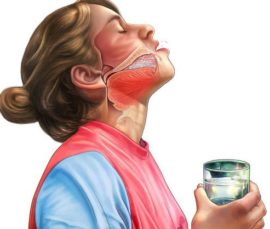 To relieve pain at home, you can rinse your mouth with a solution of soda with salt or herbal infusion of chamomile, calendula, St. John's wort, plantain, oak bark, eucalyptus leaves. To reduce the inflammatory process, an onion-garlic mixture can be applied to the diseased tooth. To do this, finely chop the same amount of onion and garlic, add salt, let the mixture brew for three hours, apply it to a dry cotton swab and put on a sore spot, after cleaning it from saliva.
To relieve pain at home, you can rinse your mouth with a solution of soda with salt or herbal infusion of chamomile, calendula, St. John's wort, plantain, oak bark, eucalyptus leaves. To reduce the inflammatory process, an onion-garlic mixture can be applied to the diseased tooth. To do this, finely chop the same amount of onion and garlic, add salt, let the mixture brew for three hours, apply it to a dry cotton swab and put on a sore spot, after cleaning it from saliva.
Effective remedies against toothache during pregnancy are all bee products:
- zabrus reduces the risk of tooth decay, therefore, it can be used as an inexpensive prophylactic;
- propolis tincture relieves not only pain, but also inflammation;
- a mixture of honey with ground cinnamon.
Alternative methods do not always help with severe forms of the disease and severe pain, but with minor discomfort in the early stages of caries, they are effective.
Toothache Prevention
Both before and during pregnancy, it is necessary to carefully monitor the condition of the oral cavity, not to start even a small caries and visit the dentist 2 times a year. You need to use special vitamin complexes with calcium and drink plenty of clean water.
After breakfast, you can drink a glass of freshly squeezed lemon juice with orange (grapefruit or tangerines). The substances contained in citrus fruits are useful not only for the general condition of the body, but also for the health of the gums.
It is often necessary to change the brush and use two toothpastes at once: based on herbs (for example, chamomile) and with fluorine and calcium. After each cleaning, gums should be massaged with your fingertips.
If you experience toothache during pregnancy, you should do everything possible to do without the use of drugs. If folk remedies do not help, you need to consult a doctor so that he chooses the optimal and safe medication.


